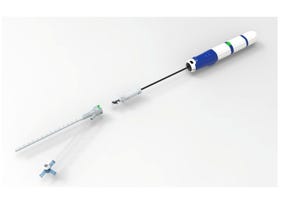MD&M Chicago Event Coverage
September 20, 2011
Mike Silverman, founder and managing partner of reliability engineering firm Ops a la Carte (Santa Clara, CA), will lead the all-day Medical Device Reliability Testing conference session at MD&M Chicago on Thursday, September 22. Silverman recently took a few minutes to brief MPMN on what attendees can expect to learn in the session and identified the most common mistake companies make when performing medical device reliability testing. MPMN: Who should attend the Medical Device Reliability Testing session?
MPMN: Who should attend the Medical Device Reliability Testing session?
Silverman: Engineers that are interested in learning more about how to choose which tests to perform and why in order to optimize the reliability of their medical product should attend the session.
MPMN: What topics will be addressed during the session?
Silverman: We will discuss how to develop a good reliability test plan and will review all of the best reliability test methods as well as how to choose which method to use and at what time. We will provide a very practical approach and will weave in many case studies to help illustrate our points.
MPMN: One topic you plan on touching upon is HALT versus ALT testing methods. When should each method be employed?
Silverman: Highly accelerated life testing (HALT) is used for finding predominant failure mechanisms in a hardware product. Engineers should use this technique when the failures are usually as a result of an overstress situation. Accelerated life testing (ALT), on the other hand, is employed to determine a product's life span, as in when wearout sets in. Engineers should use this technique when the dominant failure mechanism is due to product wearout.
MPMN: What is the most significant challenge that companies currently face in regard to medical device reliability testing?
Silverman: A major challenge for medical device manufacturers is transforming their testing into risk-based testing. In the past, engineers were accustomed to performing standards-based testing. Today, IEC 60601 Rev 3 requires that reliability testing be risk-based, meaning that your risk analysis must drive your testing program. We will explore this issue in detail in the session.
MPMN: What is the most common mistake OEMs make in relation to medical device reliability testing?
Silverman: Medical device OEMs rely much too heavily on success testing. They are focused on passing tests and checking boxes to satisfy FDA documentation and don't spend enough time exploring the true failure mechanisms that will ultimately affect their product.
MPMN: What do you hope attendees will take away from the session?
Silverman: The objective is to provide engineers with a more pragmatic approach to reliability testing based on risk elements rather than standards-based methods.
You May Also Like


